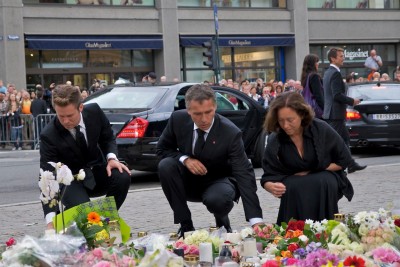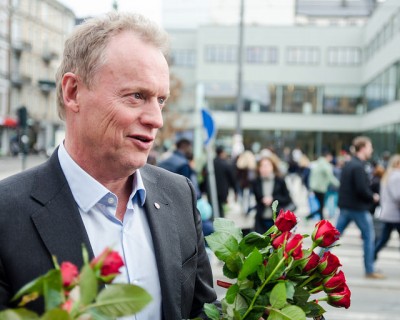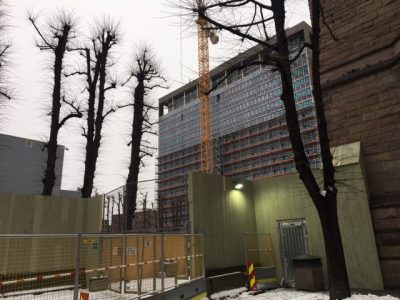NEWS ANALYSIS: It’s been 10 years since a right-wing terrorist massacred Labour Party youth at their summer camp on the Norwegian island of Utøya, after first bombing the headquarters of Norway’s Labour-led government at the time. Preparations for July 22 memorials on Thursday have set off a new wave of anguish, as many survivors and victims’ families claim the country has failed to come to grips with the home-grown extremism behind the twin attacks.

The soul-searching began months ago, in line with the release of new books, films and documentaries about the attacks on July 22, 2011. Their messages have sparked debate: Instead of lauding all the rose parades and huge gatherings just after the attacks, when Norwegians declared they would fend off terror with solidarity and love, survivors of the attacks are now much more angry.
They contend there hasn’t been adequate or official recognition of the right-wing extremist ideology behind the attacks that were carefully planned and carried out by the young Norwegian Anders Behring Breivik. Nor that he specifically targeted Norway’s Labour Party, led by Prime Minister Jens Stoltenberg at the time, and Labour’s youth organization AUF. Stoltenberg himself referred 10 years ago to Breivik’s terrorism as an attack on Norway’s democracy instead of on Labour itself, and that quickly became the view nationwide. Stoltenberg was praised both at home and internationally for his leadership at the time, and that likely led to him being tapped to take over as secretary general of NATO two years later.
RELATED STORY: Bells to toll for terror victims
Stoltenberg, who’s due to take part in the memorials later this week, told newspaper VG last week that he still thinks the decision 10 years ago to respond to Breivik’s hatred and violence with roses and solidarity was important. “It comforted,” he told VG. “The 22nd of July will always be tied to evil, hate and violence but also that it triggered love, compassion and warmth.” He added that it “contributed towards shaping attitudes,” which in turn “are important for stopping terror. We need police, intelligence and the military, but we also need attitudes and values. They were expressed in the time afterwards.”
Now, 10 years later, several uncomfortable facts have emerged. New studies released this spring by a national center collecting information on violence and traumtic stress show that more than a third of those who survived the terror on Utøya still struggle with post-traumatic stress. Around 20 percent of their family members do as well. At least a third of those who survived the massacre have received threats or hate messages via social media. A third of the parents whose children were shot and killed on Utøya are still so traumatized by their losses that they’re either partially or completely disabled.
Many are also angry that neither the government nor even their own Labour Party attempted to address what had motivated Breivik to do what he did. Labour leaders and most others seemed to accept the fact that Breivik had confessed, albeit proudly, to his crimes, that he went on trial, was convicted and sentenced to Norway’s harshest prison term that’s expected to keep him in custody for life.

It was as if Labour itself didn’t want to be put in the victim role, or be accused of trying to capitalize on the attacks. That happened later anyway, when some top politicians in both the opposition Conservative and Progress parties suggested Labour was “playing the Utøya card,” or seeking the sympathy vote. They later apologized, or their party leaders apologized for them, but the damage was done.
While Stoltenberg stressed the compassion and warmth that immediately followed the attacks 10 years ago, others are painfully aware that it didn’t last. Right-wing political parties and especially other right-wing extremists both in Norway and abroad still prefer to view Breivik as a mentally unstable loner. Norway’s own right-wing Progress Party distanced itself from Breivik, even though he’d been a member for 10 years, from 1997 until 2007 when he left the party, he later claimed, because its anti-immigration policy wasn’t as tough as he thought it should be. It seemed most comfortable for many, not just Breivik’s defense attorney Geir Lippestad (who, ironically enough had ties to Labour at the time), to brand him simply as “insane” and overlook what led to his extreme hatred of both immigrants and those supporting immigration.
RELATED STORY: What happened in Oslo 10 years ago
Then came all the hateful comments posted on then-still-budding social media platforms from white supremacists who tried to excuse Breivik’s bombing and massacre on Utøya and started attacking those who’d survived it, in writing this time. The ongoing hatred expressed towards even those who’d been shot was labelled as “shameful” by Norway’s Crown Prince Haakon last month: “Threats and hate messages are never acceptable in any case, and when it’s directed at those who survived terror, it can’t be understood.”
Denial mode
In the weeks, months and first few years after the attacks, it almost seemed as if Labour itself, long a target of hate and conspiracy, was working hard not to be branded as the target of the terrorist. Many members of its AUF youth organization still don’t feel their party has really confronted what happened to them. “We haven’t spoken nearly enough about July 22nd,” Jørgen Watne Frydnes of the Labour Party, now in charge of building Utøya back up again, told news bureau NTB. “The responsibility has been put on AUF and the survivors’ shoulders.” Frydnes, also a member of the Norwegian Nobel Committee, refers to the attacks as a sore that hasn’t healed. He thinks Norwegian society has been far too reluctant, or hasn’t dared, to fully deal with the aftermath of the attacks when the shock wore off.
Many now agree. Labour’s party secretary at the time, now Oslo Mayor Raymond Johansen, made at least one effort to “talk about the terrorist’s hatred,” but he now admits neither he nor the party followed up. “The hopeful words about solidarity, compassion and reconciliation from the time right after the attacks have not become reality,” Johansen wrote in a commentary in newspaper Aftenposten last week. “Ten years later, hatred and harassment are a bigger problem than before the attacks.” He wrote that much of Norway’s response to the attacks “has been plagued by inaction, unfairness and refusal to accept responsibility.” Books published this spring by several survivors and their own personal experiences after the attacks “unfortunately show that we don’t have much to be proud of.”

Johansen also notes that the hatred that “motivated and drove the terrorist forward” has strengthened during the past decade. Several others “have followed in his footsteps,” from New Zealand to France and Bærum, where another young white Norwegian man killed his adopted sister because she was ethnically Chinese before trying to gun down Muslims at a mosque in suburban Oslo. He failed and is also in jail, but another example, Johansen believes, “that the love and compassion we should create together hasn’t been strong enough to fend off hatred.” He also admits that AUF was left on its own after the attacks: “The Norwegian community and Labour should have taken more responsibility for a lot of what AUF has had to deal with alone.” Several of the leaders of other political parties’ youth groups at the time have since apologized for not offering more support to AUF across party lines.
Johansen, who blames himself as much as others, firmly believes that “we spoke too much” about Norway’s security and (lack of) preparedness for a terrorist attack and “too little on the ideological motive” behind the July 22 attacks. It’s clearly on the agenda now, after a steady stream of angry Utøya survivors are putting it there. “We were quiet too long,” Astrid Hoem, current leader of AUF, wrote in her own commentary in Aftenposten. She admitted that she didn’t want to talk about what happened on Utøya either: “I was 16 years old and afraid to speak out, afraid that the terrorist attack would define me. Now I’m afraid of the silence.”
Another Utøya survivor, Stian Valla Taraldsvik, agreed and tried to explain: “It’s easy to forget what happened when all you want to do is try to suppress (the fear and horrific memories of seeing friends shot).” He now vows to speak up more, and more often, to help make sure no one ever forgets what happened on Utøya, and especially why. In his own commentary in advance of this week’s memorials, Taraldsvik graphically described his own experiences of being so scared that his arms and legs were numb, and his heart was beating so hard and fast that he feared it would reveal his hiding place on Utøya. He had heard friends screaming in the seconds before being shot, bullets flying by his head and seeing 14 young colleagues huddled together near the pumphouse on Utøya, executed before his eyes.
Some of the Utøya survivors claim they tried to speak up about extremism and becoming radical back in 2011. “It wasn’t welcome, to put it mildly,” wrote Elin L’Estrange, now a member of Labour’s chapter in Ullensaker. She suggests they also were put off by newspaper editorials like one in Dagens Næringsliv (DN) at the time that warned them against “damaging the public conversation about immigration and integration,” or criticizing right-wingers’ freedom of expression. “I’m finished with moderating myself,” L’Estrange wrote in her recent commentary in Aftenposten, “because I’m angry. Furious, in fact, at a society that has let right-wing extremism and Breivik’s thoughts have more opportunity to inflict damage.”

It’s also been noted (by among others an attorney for victims’ families) that Norway still hasn’t managed to erect a national monument to the victims of the twin attacks (eight at government headquarters in downtown Oslo and 69 on Utøya), that conspiracy theories and hate directed at the Labour Party still haven’t been deemed a threat, and that the ruins of government headquarters have remained a gaping sore in the center of Oslo, with redevelopment of the bombed site long delayed and only now getting underway.
“It was difficult for Norwegian society to accept that these (attacks) were carried out by an arch-Norwegian racist and homophobic hater of women,” wrote attorney Ragni Løkholm Ramberg. “There’s never been anyone feeling a need to declare an Islamist terrorist as mentally ill (like there was with Breivik). That’s why we need to talk about why this happened, and come to grips with the politics behind it. Otherwise we’re not doing the necessary job of preventing more gruesome events in the future.”
Stoltenberg is also involved with fending off terrorism in his work at NATO: “I’ve been in New York, Paris and Christchurch in New Zealand, in Kabul, Baghdad and other places where people have lost loved ones in terrorist attacks. I’m often reminded that terrorist attacks unfortunately occur in many countries and that terror is all about people.” He hasn’t been directly criticized for how he handled the immediate aftermath of the attacks but he and Labour lost the next election in 2013. Now Stoltenberg’s successor as Labour leader, Jonas Gahr Støre, seems more willing to tackle the right-wing terrorism issue and what he calls “the difficult balance” between being a terror target and representing government power that he and Labour look likely to regain in the upcoming national election.
Støre and Tonje Brenna, another Utøya survivor who’s widely tipped to be a member of a new Labour-led government, are now calling on Norwegians to keep speaking out against divisive and conspiratorial discussion “because we now know it can be dangerous.” They’re glad Norway’s Conservative Prime Minister Erna Solberg has stated that she “understands that many don’t think Norway has come to terms with the terrorist’s poilitical ideas.” They’re also glad the conservative Progress Party has finally declared that the terrorist attacks of July 22, 2011 were attacks on the Labour Party. “That acknowledgement is important,” they wrote, but they also worry that Progress is still reluctant to concentrate on the political aspects of the attacks, claiming that will be divisive.
“We disagree,” Støre and Brenna wrote, adding that Progress’ “tone” is that of victim itself since July 22, 2011. “that’s of course not true, but Progress must tolerate comments from some of its leading politicians meet criticism when they stir up conspiracy theories and division.”
“We believe that at the core of the fight against extremism that can lead to terror, is an acknowledgement that words and expression can lead to acts of terrorism,” they wrote, noting how intelligence experts in Norway now believe right-wing extremists pose just as much a threat as Islamist extremists. “Let’s take this aspect of our terror preparedness seriously. The years after July 22 have shown that we have a long way to go.”
newsinenglish.no/Nina Berglund

